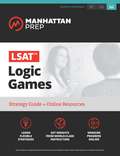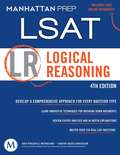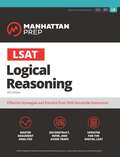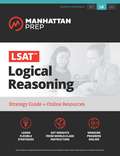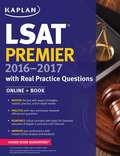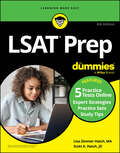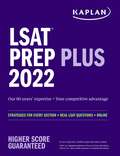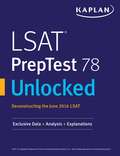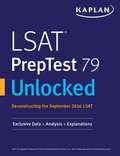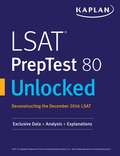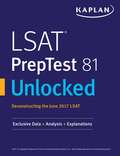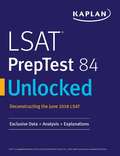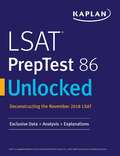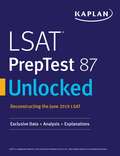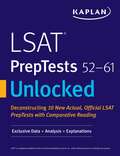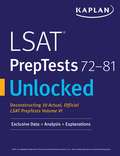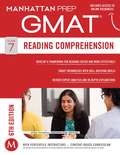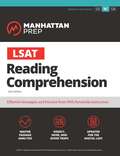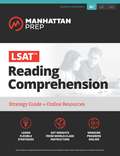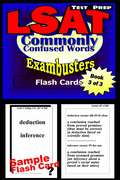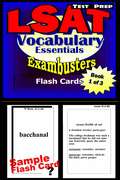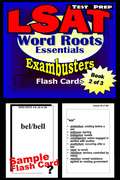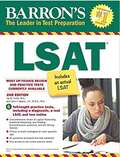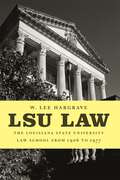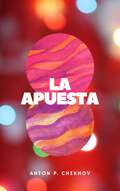- Table View
- List View
LSAT Logic Games: Strategy Guide + Online Tracker
by Manhattan PrepManhattan Prep's LSAT Logic Games is truly cutting edge. Containing the best of Manhattan Prep's proven strategies, this book will teach you how to tackle the LSAT logic games efficiently and flexibly.Beginning with how to recognize each and every game type, LSAT Logic Games takes you through the entire solving process. You will learn strategies for making inferences, techniques for accurate diagramming, and tools for improving your time management.Each chapter is designed to encourage mastery with timed drill sets that use real LSAT logic game questions and provide in-depth explanations, including hand-drawn diagrams and notes from Manhattan Prep's expert LSAT instructors. The book wraps with coached practice sets and complete solutions to all the logic games in PrepTests 40-70.Additional resources are available online through the Manhattan Prep website. Used by itself or with other Manhattan Prep materials, LSAT Logic Games will push you to your top score.
LSAT Logical Reasoning
by Manhattan PrepOffering a new take on the LSAT logical reasoning section, the Manhattan Prep Logical Reasoning LSAT Strategy Guide is a must-have resource for any student preparing to take the exam. Containing the best of Manhattan Prep's expert strategies, this book will teach you how to untangle the web of LSAT logical reasoning questions confidently and efficiently.Avoiding an unwieldy and ineffective focus on memorizing sub-categories and steps, the Logical Reasoning LSAT Strategy Guide encourages a streamlined method that engages and improves your natural critical-thinking skills. Beginning with an effective approach to reading arguments and identifying answers, this book trains you to see through the clutter and recognize the core of an argument. It also arms you with the tools needed to pick apart the answer choices, offering in-depth explanations for every single answer - both correct and incorrect - leading to a complex understanding of this subtle section.Each chapter in the Logical Reasoning LSAT Strategy Guide uses real LSAT questions in drills and practice sets, with explanations that take you inside the mind of an LSAT expert as they work their way through the problem. Further practice sets and other additional resources are included online and can be accessed through the Manhattan Prep website.Used by itself or with other Manhattan Prep materials, the Logical Reasoning LSAT Strategy Guide will push you to your top score.
LSAT Logical Reasoning: 8. 5 X 5. 5 Gift Edition (Manhattan Prep LSAT Strategy Guides)
by Manhattan PrepManhattan Prep&’s LSAT Logical Reasoning guide, fully updated for the digital exam, will teach you how to untangle Logical Reasoning problems confidently and efficiently. Manhattan Prep&’s LSAT guides use officially-released LSAT questions and are written by the company&’s instructors, who have all scored a 172 or higher on the official LSAT—we know how to earn a great score and we know how to teach you to do the same.This guide will train you to approach LSAT logical reasoning problems as a 99th-percentile test-taker does:Recognize and respond to every type of questionDeconstruct the text to find the core argument or essential factsSpot—and avoid—trap answersTake advantage of the digital format to work quickly and strategicallyEach chapter in LSAT Logical Reasoning features drill sets—made up of real LSAT questions—to help you absorb and apply what you&’ve learned. The extensive solutions walk you through every step needed to master Logical Reasoning, including an in-depth explanation of every answer choice, correct and incorrect.
LSAT Logical Reasoning: Strategy Guide + Online Tracker
by Manhattan PrepOffering a new take on the LSAT logical reasoning section, Manhattan Prep's LSAT Logical Reasoning is a must-have resource for any student preparing to take the exam.Using Manhattan Prep's expert strategies, this book will teach you how to untangle the web of LSAT logical reasoning questions confidently and efficiently. LSAT Logical Reasoning encourages a streamlined method to engage and improve your natural critical thinking skills.Beginning with an effective approach to reading arguments and identifying answers, LSAT Logical Reasoning trains you to see through the clutter and recognize the core of an argument. It also arms you with the tools to pick apart the answer choices, offering in-depth explanations for every answer--both correct and incorrect--leading to a complex understanding of this subtle section.Each chapter in LSAT Logical Reasoning uses real LSAT questions in drills and practice sets, with explanations that take you inside the mind of an LSAT expert as they work through the problem.Additional practice and resources are available online through the Manhattan Prep website. Used by itself or with other Manhattan Prep materials, LSAT Logical Reasoning will push you to your top score.
LSAT Premier 2016-2017
by KaplanThe #1 comprehensive LSAT prep book on the market just got better. Kaplan's LSAT Premier 2016-2017 is an updated version of the best-selling comprehensive LSAT prep book on the market. Written by Kaplan's expert LSAT faculty who teach the world's most popular LSAT course, this book contains in-depth strategies, test information, and hundreds of real LSAT questions from LSAC for the best in realistic practice with detailed explanations for each.
LSAT Prep For Dummies, 4th Edition (+5 Practice Tests Online)
by Scott A. Hatch Lisa Zimmer HatchImpress law school admissions committees with your high LSAT score! For prospective law school students, the Law School Admission Test (LSAT) is a crucial part of the admissions process. Updated to reflect the latest changes to the LSAT, this revised edition of LSAT Prep For Dummies ensures you have the info you need to achieve your best score on exam day. With plenty of review materials, including five practice tests online, expert advice, and testing strategies, you'll find everything you need to help you succeed. Get clear and easy-to-understand reviews of all the topics covered on the LSAT exam Practice, practice, practice, with sample questions and full-length tests Study for the new LSAT, so you aren't wasting your precious study time on outdated materials Learn insider tips and strategies for maximizing your test preparation and boosting your score Law school is waiting—and Dummies will help you get there.
LSAT Prep Plus 2022: Strategies for Every Section + Real LSAT Questions + Online (Kaplan Test Prep)
by Kaplan Test PrepKaplan's LSAT Prep Plus 2022–2023 is the single, most up-to-date resource that you need to face the LSAT exam with confidenceFully compatible with the LSAT testmaker&’s digital practice toolOfficial LSAT practice questions and practice examInstructor-led online workshops and expert video instructionUp-to-date for the Digital LSAT In-depth test-taking strategies to help you score higher We are so certain that LSAT Prep Plus 2022–2023 offers all the knowledge you need to excel on the LSAT that we guarantee it: after studying with the online resources and book, you'll score higher on the LSAT—or you'll get your money back.The Best ReviewKaplan&’s LSAT experts share practical tips for using LSAC&’s popular digital practice tool and the most widely used free online resources.Study plans will help you make the most of your practice time, regardless of how much time that is. Our exclusive data-driven learning strategies help you focus on what you need to study.In the online resources, an official full-length exam from LSAC, the LSAT testmaker, will help you feel comfortable with the exam format and avoid surprises on Test Day.Hundreds of real LSAT questions with detailed explanationsInteractive online instructor-led workshops for expert reviewOnline test analytics that analyze your performance by section and question typeExpert GuidanceLSAT Prep Plus comes with access to an episode from Kaplan's award-winning LSAT Channel, featuring one of Kaplan's top LSAT teachers.We know the test: Kaplan's expert LSAT faculty teach the world's most popular LSAT course, and more people get into law school with a Kaplan LSAT course than all other major test prep companies combined.Kaplan's experts ensure our practice questions and study materials are true to the test.We invented test prep—Kaplan (www.kaptest.com) has been helping students for 80 years. Our proven strategies have helped legions of students achieve their dreams.
LSAT PrepTest 78 Unlocked: Exclusive Data + Analysis + Explanations
by Kaplan Test PrepDeconstructing the June 2016 LSAT Taking an official LSAC PrepTest is great practice for the LSAT, but reviewing a practice test afterward is where you really improve. Supercharge your LSAT prep with Kaplan's LSAT PrepTest 78 Unlocked. * Complete explanations for every question and answer choice * Sample Logic Games sketches and Reading Comprehension roadmaps * The Inside Story: Exclusive data on question difficulty and student performance * 8 Can’t Miss Features of PrepTest 78 * PrepTest 78 In Context: Comparison of PrepTest 78 to recent LSAT trends * Glossary of LSAT terminology Every question and answer choice is discussed, along with detailed strategies for racking up points and exclusive data on student performance identifying the most difficult questions and how PrepTest 78 compares to recent LSAT trends. In addition, you’ll see sample sketchwork for logic games and sample roadmaps for reading comprehension passages. If you are new to the LSAT, a glossary offers definitions for terminology that will help you to think like the testmaker. *PrepTest 78 not included. LSAT® is a registered trademark of the Law School Admission Council, which neither sponsors nor endorses this product.
LSAT PrepTest 79 Unlocked: Exclusive Data + Analysis + Explanations
by Kaplan Test PrepDeconstructing the September 2016 LSAT Taking an official LSAC PrepTest is great practice for the LSAT, but reviewing a practice test afterward is where you really improve. Supercharge your LSAT prep with Kaplan's LSAT PrepTest 79 Unlocked. * Complete explanations for every question and answer choice * Sample Logic Games sketches and Reading Comprehension roadmaps * The Inside Story: Exclusive data on question difficulty and student performance * 8 Can’t Miss Features of PrepTest 79 * PrepTest 79 In Context: Comparison of PrepTest 79 to recent LSAT trends * Glossary of LSAT terminology Every question and answer choice is discussed, along with detailed strategies for racking up points and exclusive data on student performance identifying the most difficult questions and how PrepTest 79 compares to recent LSAT trends. In addition, you’ll see sample sketchwork for logic games and sample roadmaps for reading comprehension passages. If you are new to the LSAT, a glossary offers definitions for terminology that will help you to think like the testmaker. *PrepTest 79 not included. LSAT® is a registered trademark of the Law School Admission Council, which neither sponsors nor endorses this product.
LSAT PrepTest 80 Unlocked: Exclusive Data + Analysis + Explanations
by Kaplan Test PrepDeconstructing the December 2016 LSAT Taking an official LSAC PrepTest is great practice for the LSAT, but reviewing a practice test afterward is where you really improve. Supercharge your LSAT prep with Kaplan's LSAT PrepTest 80 Unlocked. * Complete explanations for every question and answer choice * Sample Logic Games sketches and Reading Comprehension roadmaps * The Inside Story: Exclusive data on question difficulty and student performance * 8 Can’t Miss Features of PrepTest 80 * PrepTest 80 In Context: Comparison of PrepTest 80 to recent LSAT trends * Glossary of LSAT terminology Every question and answer choice is discussed, along with detailed strategies for racking up points and exclusive data on student performance identifying the most difficult questions and how PrepTest 80 compares to recent LSAT trends. In addition, you’ll see sample sketchwork for logic games and sample roadmaps for reading comprehension passages. If you are new to the LSAT, a glossary offers definitions for terminology that will help you to think like the testmaker. *PrepTest 80 not included. LSAT® is a registered trademark of the Law School Admission Council, which neither sponsors nor endorses this product.
LSAT PrepTest 81 Unlocked: Exclusive Data, Analysis & Explanations for the June 2017 LSAT
by Kaplan Test PrepKaplan's LSAT PrepTest 81 Unlocked features comprehensive explanations for every question in the LSAC's Official LSAT PrepTest 81. Reviewing a practice test is the key to improving your score, and in PrepTest 81 Unlocked Kaplan's LSAT experts deconstruct the June 2017 LSAT to help you learn why you missed questions and how to get the right answers more efficiently. Note: PrepTest 81 is not included in this book. You'll need to purchase that separately.The Best ReviewComplete explanations for every question and answer choiceTest-taking strategies to help you score the most pointsSample sketchwork for logic gamesSample roadmaps for reading comprehension passagesExclusive data on question difficulty and student performance to help you focus your efforts where you'll need them mostGlossary with key terminology to help you think like the testmakerUp-to-date test information, including 8 can't-miss features of PrepTest 81 and how it compares to recent LSAT trendsExpert GuidanceWe know the test: Kaplan's expert LSAT faculty teach the world's most popular LSAT course, and more people get into law school with a Kaplan LSAT course than all other major test prep companies combined.Kaplan's expert psychometricians ensure our practice questions and study materials are true to the test.We invented test prep—Kaplan (www.kaptest.com) has been helping students for almost 80 years. Our proven strategies have helped legions of students achieve their dreams.
LSAT PrepTest 84 Unlocked: Exclusive Data + Analysis + Explanations (Kaplan Test Prep)
by Kaplan Test PrepDeconstructing the June 2018 LSATTaking an official LSAC PrepTest is great practice for the LSAT, but reviewing a practice test afterward is where you really improve. Supercharge your LSAT prep with Kaplan's LSAT PrepTest 84 Unlocked.Complete explanations for every question and answer choiceSample Logic Games sketches and Reading Comprehension roadmapsThe Inside Story: Exclusive data on question difficulty and student performance8 Can’t-Miss Features of PrepTest 84PrepTest 84 In Context: Comparison of PrepTest 84 to recent LSAT trendsGlossary of LSAT terminologyEvery question and answer choice is discussed, along with detailed strategies for racking up points and exclusive data on student performance identifying the most difficult questions and how PrepTest 84 compares to recent LSAT trends. In addition, you’ll see sample sketchwork for logic games and sample roadmaps for reading comprehension passages. If you are new to the LSAT, a glossary offers definitions for terminology that will help you to think like the testmaker.*PrepTest 84 not included. LSAT® is a registered trademark of the Law School Admission Council, which neither sponsors nor endorses this product.
LSAT PrepTest 86 Unlocked: Exclusive Data + Analysis + Explanations (Kaplan Test Prep)
by Kaplan Test PrepDeconstructing the November 2018 LSATTaking an official LSAC PrepTest is great practice for the LSAT, but reviewing a practice test afterward is where you really improve. Supercharge your LSAT prep with Kaplan's LSAT PrepTest 86 Unlocked.Complete explanations for every question and answer choiceSample Logic Games sketches and Reading Comprehension roadmapsThe Inside Story: Exclusive data on question difficulty and student performance8 Can’t-Miss Features of PrepTest 86PrepTest 86 In Context: Comparison of PrepTest 86 to recent LSAT trendsGlossary of LSAT terminologyEvery question and answer choice is discussed, along with detailed strategies for racking up points and exclusive data on student performance identifying the most difficult questions and how PrepTest 86 compares to recent LSAT trends. In addition, you’ll see sample sketchwork for logic games and sample roadmaps for reading comprehension passages. If you are new to the LSAT, a glossary offers definitions for terminology that will help you to think like the testmaker.*PrepTest 85 not included. LSAT® is a registered trademark of the Law School Admission Council, which neither sponsors nor endorses this product.
LSAT PrepTest 87 Unlocked (Kaplan Test Prep)
by Kaplan Test PrepDeconstructing the November 2018 LSATTaking an official LSAC PrepTest is great practice for the LSAT, but reviewing a practice test afterward is where you really improve. Supercharge your LSAT prep with Kaplan's LSAT PrepTest 86 Unlocked.Complete explanations for every question and answer choiceSample Logic Games sketches and Reading Comprehension roadmapsThe Inside Story: Exclusive data on question difficulty and student performance8 Can&’t-Miss Features of PrepTest 86PrepTest 86 In Context: Comparison of PrepTest 86 to recent LSAT trendsGlossary of LSAT terminologyEvery question and answer choice is discussed, along with detailed strategies for racking up points and exclusive data on student performance identifying the most difficult questions and how PrepTest 86 compares to recent LSAT trends. In addition, you&’ll see sample sketchwork for logic games and sample roadmaps for reading comprehension passages. If you are new to the LSAT, a glossary offers definitions for terminology that will help you to think like the testmaker.*PrepTest 85 not included. LSAT® is a registered trademark of the Law School Admission Council, which neither sponsors nor endorses this product.
LSAT PrepTests 52-61 Unlocked: Exclusive Data + Analysis + Explanations (Kaplan Test Prep)
by Kaplan Test PrepKaplan's LSAT PrepTests 52-61 Unlocked features comprehensive explanations for every question in the LSAC's official 10 New Actual, Official LSAT PrepTests with Comparative Reading. Reviewing a practice test is the key to improving your score, and in PrepTests 52-61 Kaplan's LSAT experts deconstruct 10 actual, official PrepTests to help you learn why you missed questions and how to get the right answers more efficiently. Note: PrepTests 52-61 are not included in this book. You'll need to purchase those separately.Comprehensive ReviewDetailed explanations for every questions and answer choiceTest-taking strategies to help you score the most pointsSample sketchwork for logic gamesSample roadmaps for reading comprehension passagesGlossary with key terminology to help you think like the testmakerExpert GuidanceWe know the test: Kaplan's expert LSAT faculty teach the world's most popular LSAT course, and more people get into law school with a Kaplan LSAT course than all other major test prep companies combinedKaplan's expert psychometricians ensure our practice questions and study materials are true to the testWe invented test prep—Kaplan (www.kaptest.com) has been helping students for 80 years, and our proven strategies have helped legions of students achieve their dreams
LSAT PrepTests 72-81 Unlocked: Exclusive Data + Analysis + Explanations
by Kaplan Test PrepKaplan's LSAT PrepTests 72-81 Unlocked features comprehensive explanations for every question in the LSAC's official LSAT PrepTests Volume VI. Reviewing a practice test is the key to improving your score, and in PrepTests 72-81 Kaplan's LSAT experts deconstruct 10 actual, official PrepTests to help you learn why you missed questions and how to get the right answers more efficiently. Note: PrepTests 72-81 are not included in this book. You'll need to purchase those separately.Comprehensive ReviewDetailed explanations for every questions and answer choiceTest-taking strategies to help you score the most pointsSample sketchwork for logic gamesSample roadmaps for reading comprehension passagesExclusive data and analysis of actual test-taker performance and question difficulty to help you focus your efforts where you'll need them mostGlossary with key terminology to help you think like the testmakerExpert GuidanceWe know the test: Kaplan's expert LSAT faculty teach the world’s most popular LSAT course, and more people get into law school with a Kaplan LSAT course than all other major test prep companies combined.Kaplan's expert psychometricians ensure our practice questions and study materials are true to the test.We invented test prep—Kaplan (www.kaptest.com) has been helping students for almost 80 years. Our proven strategies have helped legions of students achieve their dreams.
LSAT Reading Comprehension (Manhattan Prep GMAT Strategy Guides)
by Manhattan PrepDesigned around the real-world legal applications of reading comprehension, the Manhattan Prep Reading Comprehension LSAT Strategy Guide is an essential tool for a surprisingly tricky part of the LSAT. Containing the best of Manhattan Prep's expert strategies, this book will train you to approach the LSAT as a law student would approach a legal text--actively and with a purpose.The Reading Comprehension LSAT Strategy Guide teaches you how to recognize the core argument and then use it as a framework on which to organize the entire passage, improving the speed and clarity with which you read. To further improve your reading, it walks you through the process of annotation, discussing where and how to take notes in order to maximize your comprehension without eating up precious time. It also looks at what types of questions the LSAT asks and then arms you with the skills you need to spot issues and identify correct answers.Each chapter in the Reading Comprehension LSAT Strategy Guide features drills and full practice sets--made up of real LSAT questions--to help you absorb and apply what you've learned, while numerous, in-depth solutions walk you through the process of selecting the right answer and help you to achieve mastery. Further practice sets and other additional resources are included online and can be accessed through the Manhattan Prep website.Used by itself or with other Manhattan Prep materials, the Reading Comprehension LSAT Strategy Guide will push you to your top score.
LSAT Reading Comprehension: Effective Strategies and Practice from 99th Precentile Instructors (Manhattan Prep LSAT Strategy Guides)
by Manhattan PrepManhattan Prep&’s LSAT Reading Comprehension guide, fully updated for the digital exam, is an essential tool for a surprisingly tricky part of the LSAT. Manhattan Prep&’s LSAT guides use officially-released LSAT questions and are written by the company&’s instructors, who have all scored a 172 or higher on the official LSAT—we know how to earn a great score and we know how to teach you to do the same.This guide will train you to approach Reading Comprehension as a law student would approach a legal text:Recognize the central argumentUse reading and note-taking frameworks to stay organized and retain information Execute the appropriate process for each type of questionPredict correct answers and spot trap answersTake advantage of the digital format to work quickly and strategicallyEach chapter in LSAT Reading Comprehension features drills and full practice sets—made up of real LSAT questions—to help you absorb and apply what you&’ve learned. The in-depth solutions walk you through every step needed to master LSAT Reading comprehension, from your initial passage analysis to your final answer selection.
LSAT Reading Comprehension: Strategy Guide + Online Tracker
by Manhattan PrepDesigned around the real-world legal applications of reading comprehension, Manhattan Prep's LSAT Reading Comprehension is an essential tool for a surprisingly tricky part of the LSAT.Using Manhattan Prep's expert strategies, this book will train you to approach the LSAT as a law student would approach a legal text--actively and with a purpose. LSAT Reading Comprehension teaches you how to recognize the core argument and use it as a framework to organize the entire passage, improving the speed and clarity with which you read.To further improve your reading, LSAT Reading Comprehension walks you through the annotation process, discussing where and how to take notes in order to maximize your comprehension efficiently. It also looks at the types of questions on the LSAT and arms you with the skills you need to spot issues and identify correct answers.Each chapter in LSAT Reading Comprehension features drills and full practice sets--made up of real LSAT questions--to help you absorb and apply what you've learned, while numerous, in-depth solutions walk you through the process of selecting the right answer and help you to achieve mastery.Additional practice and resources are available online through the Manhattan Prep website. Used by itself or with other Manhattan Prep materials, LSAT Reading Comprehension will push you to your top score.
LSAT Test Prep Flash Cards: Commonly Confused Words (Exambusters LSAT Workbook #3 of 3)
by Ace Inc.<P><P><i>Advisory: Bookshare has learned that this book offers only partial accessibility. We have kept it in the collection because it is useful for some of our members. Benetech is actively working on projects to improve accessibility issues such as these.</i><P><P> Do you know the difference between "fewer" and "less," when to use "it's" or "its," or how to distinguish between "historical" and "historic" or "tortuous" and "torturous?" <P><P>This course contains 500 pairs of commonly confused words, some so frequently misused that their wrong application has become acceptable to many ears. Includes part of speech, pronunciation, simple definition, and usage example. <P>Mastering the differences will improve your written grammar, verbal communication, and most importantly, your LSAT test score!<P> Exambusters LSAT Prep Workbooks provide comprehensive, fundamental LSAT review--one fact at a time--to prepare students to take practice LSAT tests. Each LSAT study guide focuses on one specific subject area covered on the LSAT exam. From 300 to 600 questions and answers, each volume in the LSAT series is a quick and easy, focused read. Reviewing LSAT flash cards is the first step toward more confident LSAT preparation and ultimately, higher LSAT exam scores!
LSAT Test Prep Flash Cards: Vocabulary Essentials (Exambusters LSAT Workbook #1 of 3)
by Ace Inc.<P><P><i>Advisory: Bookshare has learned that this book offers only partial accessibility. We have kept it in the collection because it is useful for some of our members. Benetech is actively working on projects to improve accessibility issues such as these.</i><P><P> 350 words every well-educated person should know. While you may not hear them every day, they can show up on the LSAT test, and understanding them will boost your score. <P><P>Includes sample sentence, part of speech, pronunciation, succinct, easy-to-remember definition, and common synonyms and antonyms. <P>Exambusters LSAT Prep Workbooks provide comprehensive, fundamental LSAT review--one fact at a time--to prepare students to take practice LSAT tests. Each LSAT study guide focuses on one specific subject area covered on the LSAT exam. From 300 to 600 questions and answers, each volume in the LSAT series is a quick and easy, focused read. Reviewing LSAT flash cards is the first step toward more confident LSAT preparation and ultimately, higher LSAT exam scores!
LSAT Test Prep Flash Cards: Word Roots Essentials (Exambusters LSAT Workbook #2 of 3)
by Ace Inc.<P><P><i>Advisory: Bookshare has learned that this book offers only partial accessibility. We have kept it in the collection because it is useful for some of our members. Benetech is actively working on projects to improve accessibility issues such as these.</i><P><P> A unique collection of 380 essential Word Roots, Prefixes, and Suffixes, each with up to ten derivative word examples and definitions. Interpret new words without a dictionary. You'll view language from an entirely new perspective, and raise your LSAT test score too! <P><P>Exambusters LSAT Prep Workbooks provide comprehensive, fundamental LSAT review--one fact at a time--to prepare students to take practice LSAT tests. Each LSAT study guide focuses on one specific subject area covered on the LSAT exam. From 300 to 600 questions and answers, each volume in the LSAT series is a quick and easy, focused read. Reviewing LSAT flash cards is the first step toward more confident LSAT preparation and ultimately, higher LSAT exam scores!
LSAT: With Online Tests
by Jay B. Cutts John F. MaresThis must-have review book thoroughly prepares law school candidates for the all-important Law School Admission Test. <p><p>An introductory chapter explains the LSAT's format, suggests a detailed three-month study plan for success, and presents a diagnostic test with explained answers. Chapters that follow explain and review each of the LSAT's sections: Logical Reasoning, Reading Comprehension, and Analytical Reasoning. <p><p> The LSAT EssayEach chapter includes study tips, strategies for understanding and correctly answering the questions, critical strategies for controlling time, and a sample test with explained answers. All tests contain answer keys and through answer explanations. <p><p>BONUS ONLINE TESTS:Test takers who purchase this book will get access to two additional online practice LSATs with timed test sections, explained answers, and automated scoring. Those who purchase the book will also have access to online explanations for a second actual LSAT exam.
LSU Law: The Louisiana State University Law School from 1906 to 1977
by W. Lee HargraveFrom its founding in 1906, the Louisiana State University Law School has offered its students a truly distinctive legal education. Integrated programs in Louisiana’s unique civil law, in Anglo-American common law and federal law, and in international and comparative law create a global law curriculum recognized for both its academic excellence and its outstanding teaching, research, and public service faculty. In LSU Law, alumnus and professor W. Lee Hargrave chronicles the first seventy years of this institution—from its opening classes to the death of its longtime dean, Paul M. Hebert, and its transformation into an autonomous Law Center. He reveals the faces and forces that have helped to create the special mystique surrounding the school and the significance attached to a law degree from LSU.After an initial discussion of the legal profession in Louisiana before the establishment of formal academic instruction, Hargrave maps the school’s growth and development. He charts the organizational difficulties of the early years, reputation building in the twenties, politically influenced extravagance in the thirties, wartime challenges in the forties, return to normalcy in the fifties, steady growth in the sixties, and overcrowding in the seventies. Throughout, he explores all aspects of the school—its administrators and faculty, student body, shifting admission requirements, curriculum, grading system debates, influence on Louisiana’s legal community and state government, and much more. He also describes how students lived and learned during each era and discusses the effects of outside people and events—including Huey P. Long, World War II, and the civil rights movement—on the school. Hargrave tells the history of the LSU Law School in the context of changes that occurred in legal education throughout the United States, making his work of interest to legal historians and the national law school community. Alumni will also appreciate this detailed study of what has become a Louisiana institution.
La Apuesta
by Anton P. Chekhov"La Apuesta" es un cuento de 1889 de Anton Chekhov sobre un banquero y un joven abogado que hacen una apuesta entre ellos tras una conversación sobre si la pena de muerte es mejor o peor que la cadena perpetua.
